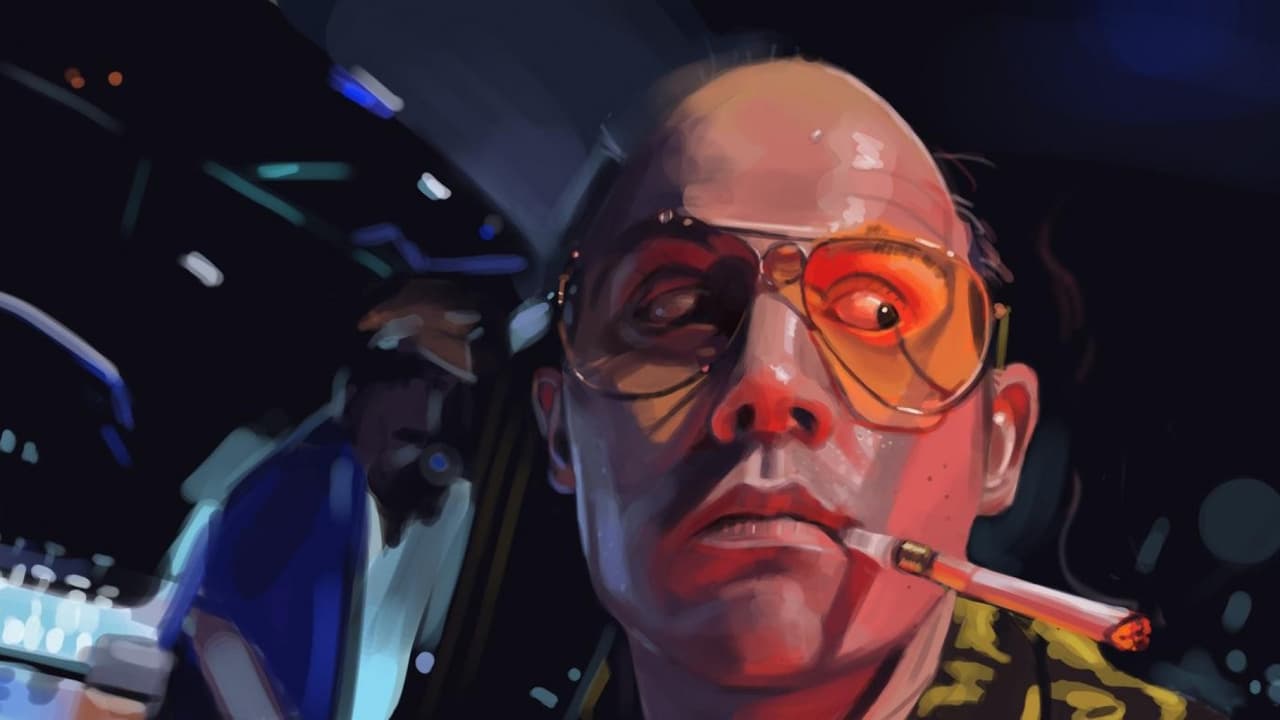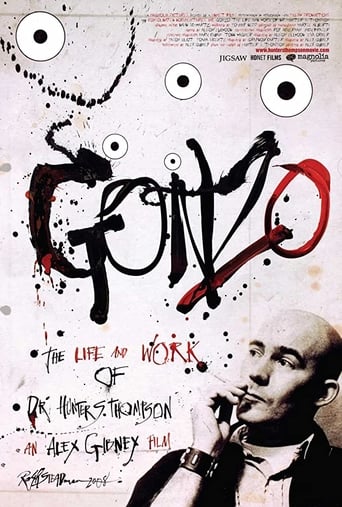



the audience applauded
At first rather annoying in its heavy emphasis on reenactments, this movie ultimately proves fascinating, simply because the complicated, highly dramatic tale it tells still almost defies belief.
View MoreThe film creates a perfect balance between action and depth of basic needs, in the midst of an infertile atmosphere.
View MoreThrough painfully honest and emotional moments, the movie becomes irresistibly relatable
View MoreGonzo: The Life and Work of Dr. Hunter S. Thompson: 6 out of 10: Is Hunter S Thompson any more relevant to modern journalism than Joe Namath is to modern football? After all, both were men of their times. In addition, both faded badly by the mid-seventies. Thompson's early work is excellent (a copy of "The Proud Highway" sits on my bookshelf) and reached its pinnacle with Fear and Loathing on the Campaign Trail '72.A mere three years later Rolling Stone publisher Jenn Warner had become so fed up with Thompson he basically tried to have him killed.As Gonzo.org puts it "Then, early one evening in March 1975, Hunter was watching a nightmarish film of the evacuation of Da Nang on the evening news. The phone rang, and Hunter picked it up. It was Wenner, saying, "How would you like to go to Vietnam?" Hunter could not resist. The collapse of the American empire was a happening tailor-made for his talents. Within days, he was heading out over the Pacific. He arrived in Saigon hours after Thieu's palace had been bombed and staffed by his own Air Force. For a man who lived with the conviction that the world was going to end next Monday, this was an especially ominous portent. Thompson had the sense of "walking into a death camp." This was it. He would never get out alive. As it turned out, the fate that was in store for him was even worse. Thompson discovered that, even as he was on his way to Vietnam, Wenner had taken him off retainer - in effect, fired him - and with the retainer went his staff benefits, including health and life insurance." Also leaving him no way out of Vietnam... a one-way ticket if you will.Dude that is cold...And that is the very nature of the problem with this documentary. Why is not this story mentioned? Who knows? It certainly was a turning point in Thompsons life (He apparently became more withdrawn and paranoid afterwards... understandably so) Gonzo is a pollyanna look at Thompson. The abuse of his first marriage gets a glancing look and all the interviewees (Including Jimmy Carter, Pat Buchanan and Jenn Werner) seem hesitant to speak ill of the dead.The fact that in a few short years Thompson turned from a well-respected writer into a Muppet and Doonesbury cartoon is not covered well. The fact is mentioned but the reasons are glossed over. It is as if the film is worried that by mentioning his failures it will reduce his significance.Yet, I would argue that Thompson's effect on Journalism is larger than he gets credit for. Reporters nowadays often ignore facts, concentrating instead on how events make them feel. Anderson Cooper crying during the Hurricane Katrina coverage threatened to become a bigger story than the storm itself. (He was not helped when fellow Mensa candidate Wolf Blitzer said "You simply get chills every time you see these poor individuals…many of these people, almost all of them that we see are so poor and they are so black") The documentary never really focuses on this aspect either. Gonzo seems to fear pulling back any of the masks its subject wears presumably scared of what it might find. Gonzo would have been better served concentrating on one period of time and focusing its energies.That said, for those unfamiliar with Hunter S Thompson outside of his Muppet form this is a good start. Moreover, if it gets people to read his early work so much the better.
View MoreOpening with Hunter S. Thompson's written reactions to seeing 9/11 unfold on TV, Alex Gibney's Gonzo thrusts us into the idea of Hunter first as a journalist, a rebel, a successful writer, a political campaigner and finally a man, the product of all his excesses, who was loved and admired by many. In-between detailing the author's rebellion, out of control gun enthusiasm and drug use, we focus on only three major writings of his - his breakthrough novel; Hell's Angels, his most popular work, Fear & Loathing in Las Vegas and arguably his best work; Fear & Loathing on the Campaign Trail '72.Gibney gives us a cross section of interviewees, hearing mainly from his former wives and son, Juan Thompson, various ex-politicians including George McGovern and Jimmy Carter plus his Rolling Stone editor and contacts during his prolific 1970's period. Friends and peers are present too of course; Ralph Steadman, Tom Wolfe, Jimmy Buffet, but most notably Gibney avoids the trap of having an onslaught of celebrities reminisce about Hunter which helps to give the audience a more serious view of his importance to journalism and American politics, at the same time successfully evading or rehashing comments or ideas from Tom Thurman's 2006 documentary, Buy the Ticket, Take the Ride.It's put together with a professional pace, combining large amounts of archival footage and photos with narration by Johnny Depp, who reads from - and is sometimes shown reading, relevant passages from Hunter's writings. The biggest coup, however, is hearing various excerpt from Hunter's own tape recorder - showcasing unique "in the moment" time capsules with the writer whilst on his wild escapades of gonzo journalism.Ironically, the film's most clunky moment is when focusing on his most popular novel, F&L in Las Vegas. The director spends too much time showing clips from Terry Gilliam's film adaptation and not enough exploration via the interesting Depp reading device or Hunter's at the time comments - the segment certainly stamps the novels importance, but the overuse of movie footage broke up the tone a bit for me. It's a rare moment of ill judgment on Gibney's part, but the following sections on his political campaigning alongside George McGovern and his influence as a journalist on American politics during the late 60's, early 70's retain the best moments of the documentary alongside an earlier part which shows in detail Hunter's attempts to run for Sheriff of Aspen, Colorado. These are poignant moments and one where ex-wife, Sandi Hunter recalls it being Hunter's greatest moment, "having the passion to move people".As the film moves onto Hunter's suicide, the tone shifts and even though his son admits "that it was no secret" his father had planned to kill himself for many years, there's a difference between that and it actually happening. Above all, the emotion is still clear on some of the interviewees during this part, recorded not three years after the event. Appropriately, we are shown the construction of the "gonzo fist" tower Hunter had organized for his funeral and we're left with the feelings of if only he'd waited, or perhaps not killed the man over the myth. A man that Tom Wolfe describes as probably being "trapped in Gonzo".Though not definitive, Gonzo is definitely recommended for fans of Hunter Thompson, anyone with an interest in American politics or who just want to see what effect a true visionary can have on people and culture.4/5
View MoreI saw this inserted in a festival. Festivals are great occasions. There is a mood in the air, which invites us to see new things, ambitious ones. Most of the time, it must be said, i see failures, some glorious, others pure crap. But the possibility to see new surprise life altering creations compensates for all the eventually boring proofs we might have to endure. This little documentary is something of an exception in these types i described.As a film in itself it has little value. It's a collection of photographs, testimonies, old videos and testimonies made for the documentary, with a plus, Johnny Depp narrating Thompson. It is tailored like the serial documentaries the Discovery or History channel usually makes. But i actually enjoyed it. For one reason, i was ignorant about many of the aspects in his life, namely the politic involvements, which is a contradiction, among others, in the life of a counter-culture icon.Anyway, it's the very facts of Thompson's life that move the whole thing, and sparks the whole interest this may have. Because there was something that displeased me, a kind of formal contradiction which nevertheless is fun to find: H.Thompson was important as a writer, fundamentally because he broke forms, and in the process created a genre on its own. His kind of writing is essentially visual, which means it's also potentially cinematic - Gillian understood this, but in 'Fear and Loathing...' he was either to literal in his interpretation, or to attached to his own vision, so though he made a good piece, he was not fully faithful to Thompson. The visual quality of his writings can be tested in this documentary, whenever Depp reads. It's powerful, and probably more effective than any of the footage used. There lies the contradiction. The documentary is vulgar, it uses a worn out formula for serial documentaries, equivalents to the kind of dull journalistic writing Thompson wanted to evade. See my point?So, probably, Hunter will last for what he wrote, not for what he 'was'. After all, it's not uncommon or specially thrilling the kind of things he effectively did. Though that provided most of the juice and energy he puts in his writings, it's not the orgies, or the guns, or the acids that make his life worth knowing.Nevertheless, Thompson would perfectly incarnate the mood of a film festival. That's a complement.My opinion: 3/5 http://www.7eyes.wordpress.com
View MoreI don't know a lot about Thompson although I did read the Hell's Angels book a couple of times and I saw (the very awful) Fear and Loathing in Las Vegas. I have always felt that he was a man I prefer never to meet in person and wouldn't have wanted him for a neighbor. Although I am very much a child (??) of the sixties, I was more mouth than intellect. As a young lawyer, I was active of the civil rights and anti-war movements, but didn't have much interest in political campaigns. Hated Nixon and voted for whoever the Democratic candidate was.Thus I am surprised how much I enjoyed this movie. It brought back the sixties and seventies very vividly--the music and the documentary footage was very effective.Yes, it was fairly uncritical of Thompson. Tellingly, however, it closed with his ex-wife taking umbrage with the statement that his suicide was "heroic." As it is with most suicides, his was the act of a terribly angry man who was bound to show us how much we would miss him. Well, I'm still around & so is his wife & so many others. I actually felt sorry for him...I wonder if he ever had a truly happy day.This movie, then, for me, should have been subtitled "The Times of Dr. Hunter S. Thompson," because that was where it was most successful.
View More